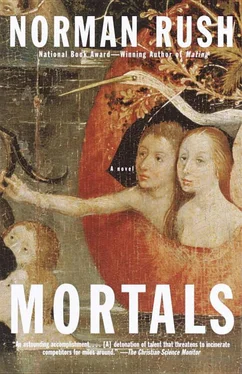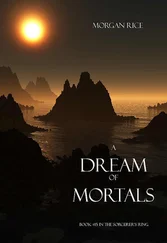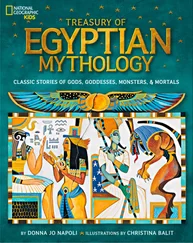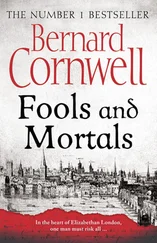Ray sat there. It was essential not to beg.
He couldn’t help it. He said, “I’ve never, never once, the whole time I’ve been working, never once lost control of any material, of my material. It just couldn’t happen and it never has happened. I’ve never had a question on security from any quarter, not one. I have my drill down. And they know my stuff at Registry.” This was begging.
“They’ll miss me at Registry,” Ray said.
Boyle said, “They’ll get over it.” He eased his chair back from the table. That was the signal for Ray to go.
He felt incapable of moving. He had to get home. But she can’t know, he thought, she can’t, this is killing me and she can’t know: Also I can hear it, I can hear it when she says it’s perfect. It’s perfect, you quit … You quit, we leave, it’s perfect, we go: But I can’t. He wanted to tell her.
Ray got to his feet. By way of acknowledging the raise, since he had to do something adult, he patted his hip pocket.
The library proper was still unpopulated, so he sat down at a corner table, with his back to the room, and opened whatever magazine he had pulled off the rack as he passed it. It was Car and Driver .
What he was facing came in two parts. Part one was the vocational part, so to speak, which was bad enough. Part one said he was through doing any significant writing and that targets would be assigned to him like to a clerk. He would have nothing to say about who was of interest, nothing. As for the case of the great enigma Davis Morel constituted, he could forget it, the best enigma of his career, but he had to do nothing, find out nothing, and be quiet. That was the vocational part.
Part two was larger and, in a way, worse. No Quarter would be a name for it. It was a dark thing, if it was true. But it was going to be true because it would explain, among other things, assigning Boyle, someone like Boyle, as chief of station in Gaborone.
Part two was a premonition or presentiment. Ray thought, Part one is my clerkship, Part two is why I can’t have Morel, but it goes beyond that and it explains why they do care about Kerekang and don’t care about Morel. It says we don’t get to relax, now that the Russians are down, it says Never Again! this is our Never Again campaign and it says we, the agency, but not only the agency, beyond it, above it, something is saying this is the task, whatever is left of the red menace you uproot, hit them while they’re down, get them out of here, fuck them, never darken our door again. The moment of relaxing and enjoying the spectacle of this ancient enemy disintegrating practically unaided would never come. He felt he knew what had to be going on in the collective mind of the victorious West. This is what they think, he thought, we look at everything that went wrong in the world, since socialism became a serious proposition, as a gigantic bloody detour forced on capital and entrepreneurship and the reality principle and the parliamentary system by these red bastards, because without socialism getting hold of first one sovereign state and then a bloc of them, there would never have been, one, fascism, which was a reaction against socialism, fear of it, and, two, there would never have been the long huge waste of resources the countries of the West had had to bear once the socialist states turned into military monsters like us: This is the way they see it, the sane forces of the world plunged into distraction for almost a hundred years, one distraction after another before normal history could begin again … First we were stuck to fight fascism, and that was close, and there never would have been any fascism without the goddamned socialist states we had to deal with and fuck next, because they were fucking with us from the start, that would be the history. Certain bastards had distracted the world with their system that didn’t work on its own anyway.
So Never Again made sense. He could see Boyle as a perfect vector of this view of things. Boyle was almost a lens to him, through which he could see this imperative articulating, swelling up. All Boyle wanted was a new heaven and a new earth, someplace all clean and nice.
Where was it the Greeks had sown the earth with salt after killing everybody there who annoyed them? It was like that. Pulling up root-stocks, pouring boiling water down ant holes, grinding the earth clean, cautery … This was what was going on. His head ached. He felt unsteady. He had the hopeless idea of going back in and talking to Boyle again, trying to. He might still be there. Boyle always stayed sitting until Ray left the room. You mainly saw him sitting, like Roosevelt. There was something wrong with one of his knees. Of course Boyle made sense being in this part of the forest, of course . Because somebody had to do something about the last real pocket of popular Marxism in the entire world, South Africa, where the South African Communist Party was recruiting like crazy and pulled plenty of strings in the ANC, which was going to govern, no question about it. Of course he had to be around here in case a black majority communism got going in a country loaded with diamonds and platinum and gold, in case Johannesburg turned into the Vatican of a new race-communism. Of course Boyle would see it differently than beloved Marion Resnick, who thought the South African Communist Party would wither away once the struggle-elite in the African National Congress turned its attention to getting rich. He didn’t know why Boyle hadn’t been sent straight to the Republic of South Africa, although there was plenty of work for him here. Botswana had been a main rear area for the ANC and there were still plenty of live connections to the ANC on the ground and under it. There were rumors of oil under the Kalahari. And Botswana was stable, but how stable?
He needed to be with Iris. He had to tell her about Boyle, but there was no way he could. But he had to see her. He could go home. He could tell Curwen he was sick, tell Curwen something, Curwen loved him, for some reason. He’d have to tell Iris he was coming down with something. Maybe he could stand to return to St. James.
He left the library and went unseeingly out into the alleyway and then into the main concourse of the mall, where nothing had changed. He looked up at the sky. A string of clouds like bloated checkmarks was passing overhead, north to south. It was a short string, amounting to nothing, not part of a system. He thought, You feel hope when something dims the sun, you hope for clouds, for rain, because you become part of the thirst when the drought goes on as long as this one. His throat was dry, but water seemed irrelevant.
He had to get home.
He was not calm. He felt like marching, oddly enough.
He would go home, but Boyle would regret this. Because the fact was, he realized, that he was not going to obey. He would show Boyle what Morel was whether he liked it or not, and he would write his best Life, and it could be done. He had power — he had his powers.
He stood on the curb, waiting for the traffic on Queens Road to slacken. Normally he was patient enough with the unrelenting traffic that flowed in the streets surrounding the mall and accepted the necessity of being poised to dart through any plausible opening, since the etiquette of the drivers, especially of the government vehicles, was a little intermittent when it came to the pedestrian right of way. But today it was intolerable, the racket, the diesel fumes, the jammed minivans blasting reggae and socca. That people wanted to take the mufflers off their cars in order to let the true power of their engines be heard was something he could understand, but he could not understand why nothing was ever done about it by the police. It was hardly a violation that required deep subtlety to detect. And there were police in the area who did intervene occasionally in traffic incidents and snarls if they were severe enough. He had to get through. No break occurred.
Читать дальше












